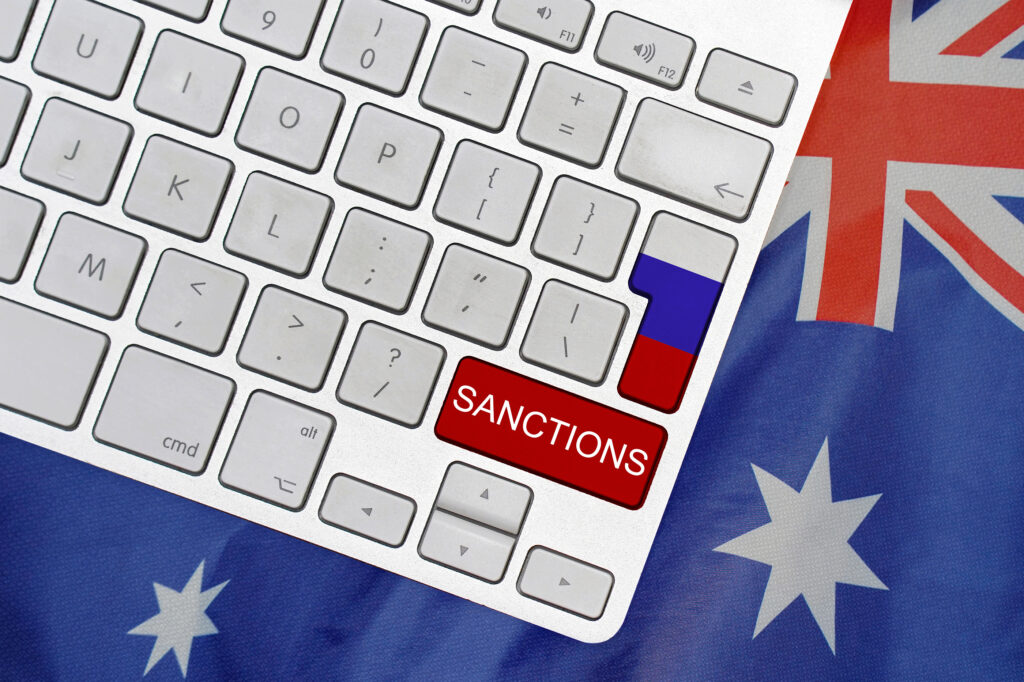A version of this article was first published by The DCN on 4 April 2022. This version incudes new and updated information.
I have previously written regarding fundamental changes to Australia’s sanctions regime, from implementing United Nations (UN) sanctions through to the adoption of our own Autonomous Sanctions and more lately, the creation of the new Thematic Sanctions.
The significance of the breadth of our sanctions regime, matched with additional controls on imports and exports, has been on display with actions taken by Australia in response to the conflict in Ukraine.
This month’s print edition of the Daily Cargo News includes an article from myself on the evolution of our sanctions regime. However, since I wrote that article, there have been significant additional developments, not all of which have been exclusively linked to the Ukrainian conflict. The ability to create autonomous sanctions and impose additional controls on imports and controls has represented a significant advantage for Australia in being flexible in its measures to meet changing circumstances.
Those developments have included the following:
- The issues related to additional autonomous sanctions associated with the Ukraine conflict. By 31 March 2022, over 500 individuals and entities have been subjected to the imposition of sanctions, prohibiting dealing with those parties and requiring the freezing of the assets of those parties.
- The issue of the first set of thematic sanctions on 29 March 2022 targeting Russian individuals responsible for the corruption that Sergei Magnitsky uncovered and those complicit in his subsequent mistreatment and death. According to the media release by the Foreign Minister: “These individuals will be subject to targeted financial sanctions, including asset freezes and travel bans. This will ensure that Australia does not become a safe haven for those already locked out of like-minded countries and their financial systems”.
- The prohibition of the export of military and defence equipment, alumina and aluminium ores (including bauxite) to Russia.
- The prohibition of the import of energy, oil and gas products from Russia.
- The announcement by the Australian Prime Minister on 31 March 2022 that, with effect from 1 April 2022, Australia would issue a formal notification withdrawing entitlement to the Most-Favoured-Nation (MFN) tariff treatment and applying an additional tariff of 35 per cent to all imports from Russia and Belarus. This will take effect from 25 April 2022 and will be in addition to general duty rates that currently apply. The Australian Border Force (ABF) has now published a “Notice of Intention to Propose Customs Tariff Alterations” to implement these changes, and we await the issue of a new Australian Customs Notice to provide further details.
- The provision of additional military equipment such as Bushmaster armoured vehicles, missiles and ammunition, additional thermal coal and other humanitarian aid.
- The notification on 5 April 2022 of further sanctions prohibiting the supply, sale or transfer of certain “luxury goods” directly or indirectly to, for the use in, or for the benefit of Russia to take effect on 7 April 2022.
These actions reflect similar actions by other countries such as the US and the other G7 countries, which have also removed MFN status from Russia. The United States (US) has also imposed broader import controls on Russian products, including prohibiting “luxury” items (such as diamonds, caviar, fish products and vodka) as well as grain and oil. The control on oil imports caused the US to release part of its “Strategic Defence Reserve” of oil for processing and use in the US economy for the first time in its history.
The breadth of these other international sanctions and restrictions also impacts Australian companies as they may require them to stop dealings with Russian companies even if those dealings are not subject to Australian sanctions. By way of example, payments to Australian companies for commercial dealings with Russian companies not sanctioned by Australia could still be stopped if the payments are directed through an Australian financial institution which has a presence in those international markets where there are sanctions in place.
These developments reflect the importance of autonomous sanctions and other controls when Russia and other countries can block the imposition of UN sanctions at the UN. They also reflect the need to be aware of the regular addition to sanctions and other controls, whether in Australia or in other countries, that could impact Australian companies.
For advice on all aspects of Australian and international trade and customs obligations, please contact our Customs & Trade team.
| Disclaimer: This publication contains comments of a general nature only and is provided as an information service. It is not intended to be relied upon, nor is it a substitute for specific professional advice. No responsibility can be accepted by Rigby Cooke Lawyers or the authors for loss occasioned to any person doing anything as a result of any material in this publication.
Liability limited by a scheme approved under Professional Standards Legislation. ©2022 Rigby Cooke Lawyers |
